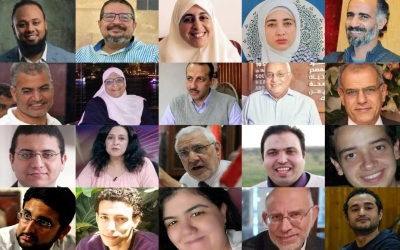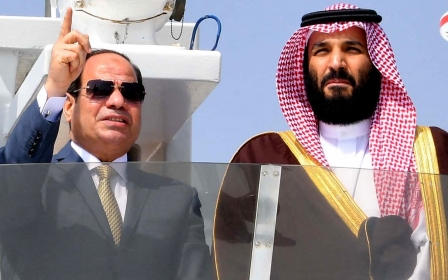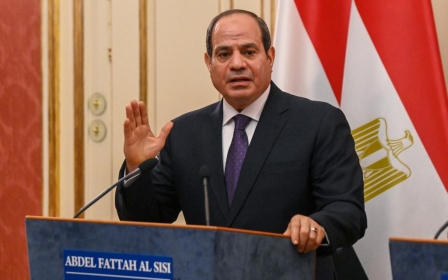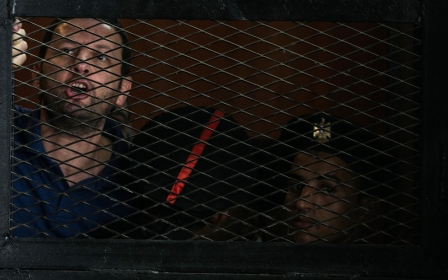Alaa Abd el-Fattah: UK government must act to free citizen jailed in Egypt
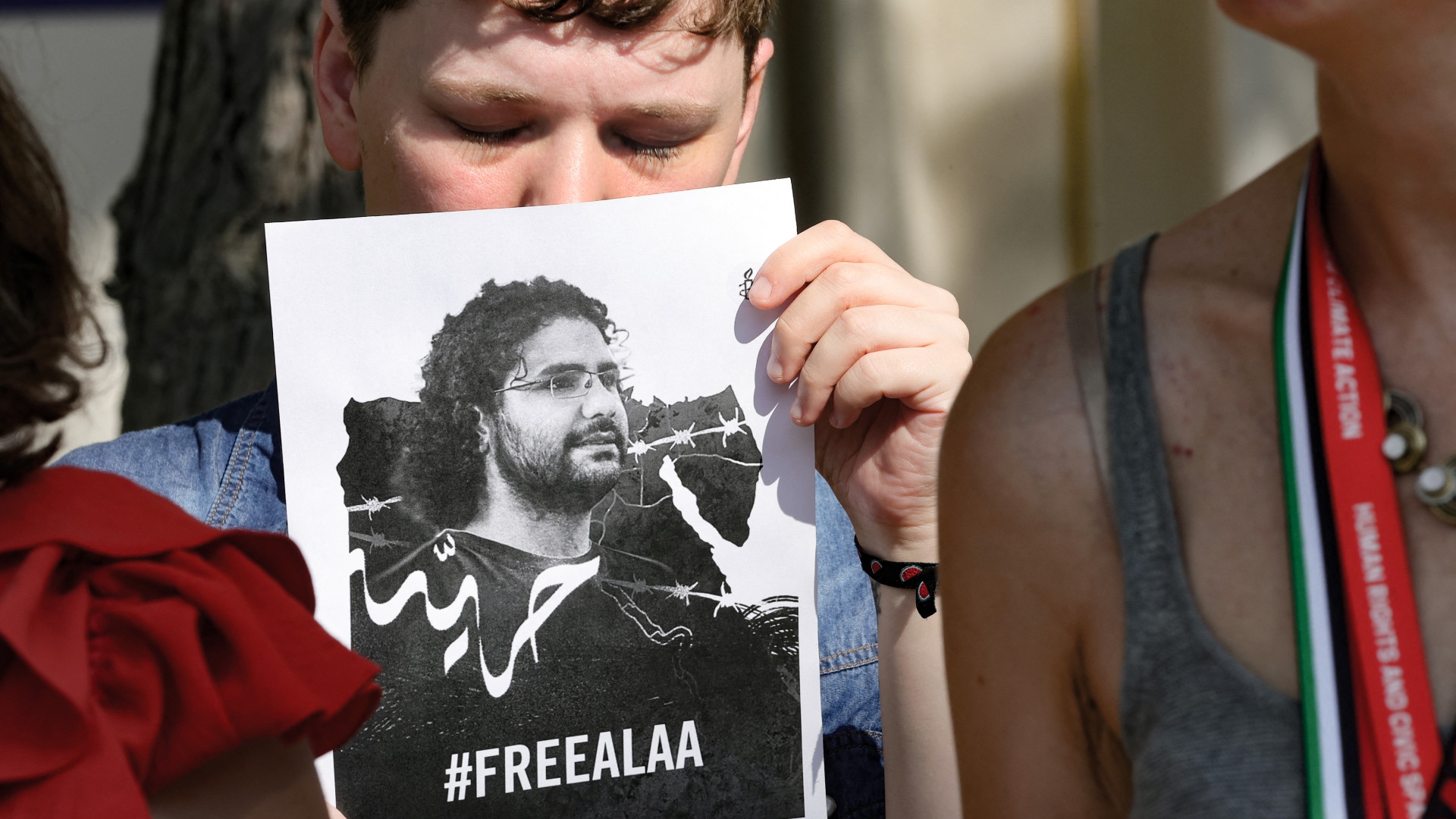
Human rights, the rule of law, freedom of speech, democracy, and the protection of British citizens abroad are all principles that the UK government has firmly, noisily - and rightly - advocated for.
Why, then, is Alaa Abd el-Fattah - a British citizen - still rotting in an Egyptian cell?
Abd el-Fattah is perhaps Egypt's most famous political prisoner. He remains behind bars, serving a five-year sentence after a patently unfair trial on charges of "spreading false news undermining national security".
His crime? He had re-shared a social media post about torture - hardly breaking news from a man who knows Egypt's highly politicised judicial system from the inside, and where torture is both well-documented and widespread.
Abd el-Fattah's current sentence is merely the latest in a long string of court cases that have kept him locked up for most of the past decade, and out of public discourse.
New MEE newsletter: Jerusalem Dispatch
Sign up to get the latest insights and analysis on Israel-Palestine, alongside Turkey Unpacked and other MEE newsletters
In October 2022, his two sisters staged a sit-in outside the UK Foreign Office, urging then-Foreign Secretary James Cleverly to take action to secure his release. Today, with a new Labour government in office, Britain must act on this.
Politically motivated charges
Abd el-Fattah is no terrorist. Nor is he a felon, an insurgent, a liar or any other form of criminal.
He is in prison because he is one of the most articulate and intelligent pro-democracy activists in Egypt. Perhaps most tellingly, he is also hugely popular.
I know this because I was imprisoned with Abd el-Fattah for several months in 2014.
Two Egyptian colleagues and I had just been arrested on our own "fake news" and terrorism charges while we worked for Al Jazeera English. We had been covering the political crisis that continued to unfold in the wake of the Arab Spring uprising of 2011.
While my colleagues went to the notorious Scorpion Prison, I went to the Tora complex on the outskirts of Cairo.
He is precisely the kind of representative of British democratic ideals that the government ought to defend and champion
There, I found myself locked up with who I came to regard as the cream of the crop of the country's liberal democratic thinkers: judges, opposition leaders, trade unionists, youth activists, poets and writers.
Abd el-Fattah occupied the cell next to mine, and during our brief hours of exercise we would stride up and down the courtyard while he gave me masterclasses in Egyptian political history, philosophy and activism.
He and his family had a long history of advocating for human rights in Egypt. They had been on the front lines of the Arab Spring. Once the long-standing autocrat Hosni Mubarak had been toppled, they became deeply immersed in efforts to forge a new and inclusive constitution. They aimed to craft something that might spare the country further episodes of dictatorship and religious extremism.
In short, he is precisely the kind of representative of British democratic ideals that the government ought to defend and champion.
Transactional approach
Abd el-Fattah gained his British passport in 2021 through his mother, the human and women's rights activist Laila Soueif, while he was still in prison.
At the time, Prime Minister Rishi Sunak made the right noises, telling his sister the government was "totally committed to resolving [her] brother's case".
A year later, while Abd el-Fattah and tens of thousands of other political prisoners were being held incommunicado during the Cop27 climate conference in Sharm el-Sheikh, Sunak stood before a phalanx of cameras and gripped the hand of his Egyptian counterpart, President Abdel Fattah el-Sisi.
The gesture gave the Egyptian leader the images and reassurance he wanted: the British government would privilege trade and political relations over its own democratic values.
It must have been particularly galling for Abd el-Fattah's family to then see the US government go to extraordinary lengths to free three of their own from Russia this month in the most complicated prisoner exchange since the Cold War.
"We thought acquiring British citizenship could be a step on the road to Abd el-Fattah's freedom," his sister, Sanaa Seif, told The Guardian. "But it feels now like it has led to false hope, wasted energy and maybe even made things worse."
Abd el-Fattah's case is sadly part of a pattern. For most of the past decade, it seems as though the Conservative government had taken a cynically transactional approach to its foreign policy, telling the likes of Hong Kong, Iran and India that London wouldn't get too noisy about Jimmy Lai, Nazanin Zaghari-Ratcliffe or Jagtar Singh Johal, respectively, as long as they maintained smooth political and trade relations.
Now, Britain's new Labour government, led by Prime Minister Keir Starmer, has a chance to reset. It won the election at least partly by promising to reintroduce Britain to the world as a mature, serious power after years of Conservative mismanagement and decline.
It has also pledged to defend British values and interests, and that - presumably - includes the interests of British citizens arbitrarily detained abroad. David Lammy, the new foreign secretary, was heavily critical of the Conservatives' failure to free Abd el-Fattah.
In releasing three of its own and a host of other political prisoners, the US government has shown what can be done with the right kind of calibrated pressure and negotiation.
Now, it is the turn of the British government. Abd el-Fattah is the perfect place to start.
The views expressed in this article belong to the author and do not necessarily reflect the editorial policy of Middle East Eye.
Middle East Eye delivers independent and unrivalled coverage and analysis of the Middle East, North Africa and beyond. To learn more about republishing this content and the associated fees, please fill out this form. More about MEE can be found here.



